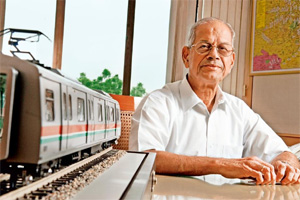Archive for the ‘DMRC’ Category
HBS students to study Sreedharan’s ethic
 On a wall behind his desk were Sanskrit quotations on the power of knowledge. Verses from the Bhagavad Gita were included in bulletins and newsletters released by the company he led. The man in question may sound like an archetypal, somewhat religious, Indian civil servant. He also ran a project that in phase I alone cost Rs.100 billion and involved building a Metro railway network in India’s Capital, successfully battling politics, cynicism and vested interests.
On a wall behind his desk were Sanskrit quotations on the power of knowledge. Verses from the Bhagavad Gita were included in bulletins and newsletters released by the company he led. The man in question may sound like an archetypal, somewhat religious, Indian civil servant. He also ran a project that in phase I alone cost Rs.100 billion and involved building a Metro railway network in India’s Capital, successfully battling politics, cynicism and vested interests.
How E. Sreedharan, former Managing Director of Delhi Metro Rail Corp. Ltd (DMRC), built a world-class mass transit system is now a Harvard Business School (HBS) case study. The case study will teach students of HBS’s advanced management programme Sreedharan’s crisis-management methods and how he got a variety of people with often opposing interests to get behind his agenda. HBS is planning to teach the course, largely attended by chief executives and board-level candidates, in the September-October session.
It will examine how Sreedharan and his team dealt with two accidents during construction in eight months in 2008-09 that led to fatalities and could have irretrievably damaged the Metro’s reputation. The study also examines DMRC’s unique structure and management ethic that enabled it to meet deadlines and budget limits.
“I was looking for a good case on project management. The fact that the Delhi Metro came in under budget and ahead of schedule caught my eye,” said V.G. Narayanan, Thomas D. Casserly, Jr professor of business administration unit head, accounting and management at HBS. He worked on the case study with Saloni Chaturvedi, researcher at HBS India Research Center. “I wanted to understand how DMRC accomplished this,” Narayanan said.
The process included a meeting with Sreedharan in 2011 and many meetings and conference calls with senior DMRC officials. The 65 km-long first phase of the Delhi Metro, of which 13 km was underground, was built in seven years and three months, less than the scheduled 10 years. By contrast, Kolkata, the only other Indian city to have a Metro at the time, took 23 years to build a 25 km line.
The Delhi Metro’s construction began in October 1998, with public services starting on 24 December 2002 on an 8.3 km stretch. It has finished 190 km of track so far. With the second phase of the construction complete, six operational lines (including the Airport Express line) and 142 stations, the current third phase of expansion is set to add another 108 km of track, three new lines and 92 more stations at an estimated cost of Rs. 300 billion.
The HBS study will run students through DMRC’s gruelling initial years that were fraught with challenges. From putting the basic organizational structure in place and building technical capabilities, there were several battles to be won that included deciding on the kind of gauge to be used, putting legal cover in place, land acquisition, and realignment and tunnelling issues.
“How does a leader inspire an organization when he/she cannot buy performance by just paying more in the form of bonuses and incentives? How does a leader respond to a crisis? We hope to explore these issues in class,” Narayanan said. Sreedharan had a consistent message and others around him absorbed his values, helping DMRC make quick decisions, Narayanan said. And by being thoughtful and considerate, he got the public on his side. “The perfect alignment of his key constituents, it seems to me, is the key to his efficiency,” Narayanan said.
Abhaya Agarwal, executive director (infrastructure and public-private partnership) at Ernst and Young, said Sreedharan’s unique combination of management skills and technical ability gave DMRC the edge. Much of his technical learning was picked up during an immensely challenging stint at Konkan Railway, connecting Mumbai to the south along the west coast of India.
“The Delhi Metro, for critics who panned the Metro rail system for being too expensive, is a great precedent that showed that a project of such scale can be achieved. The good part is Sreedharan has created a structure with such processes in place that can be followed to complete the remaining project,” said Agarwal. Sreedharan retired on 31 December, with Mangu Singh becoming the new DMRC chief.
Last year, Bangalore joined Delhi and Kolkata as a city with its own Metro rail service, when a portion of the first phase of the network was inaugurated, about 19 months behind schedule. A 6.7 km stretch of the eastern line was opened between Byappanahalli and MG Road, covering six stations. Other forthcoming Metro projects include one in Mumbai. The first line of this is being built as an east-west corridor linking Ghatkopar and Versova, and is expected to be operational this year. Anil Ambani-controlled Reliance Infrastructure Ltd (R-Infra) has been constructing the 11 km line, expected to cost Rs. 23.56 billion, since 2008. R-Infra has also won the contract for the 38 km second line, between Charkop and Mankhurd, but work on this line is yet to begin.
Source: Mint, June 2, 2012